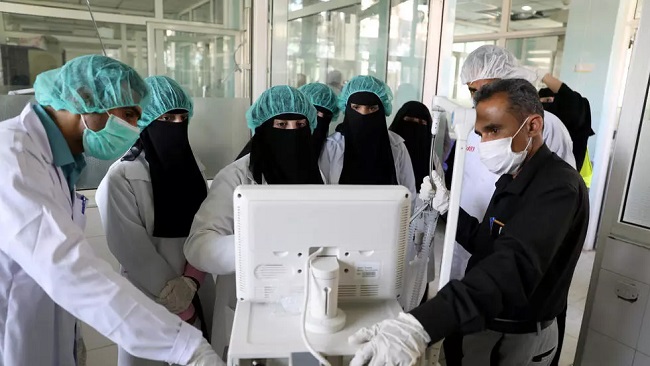World coronavirus deaths surpass 100,000 as billions remain under lockdown
The global coronavirus death toll topped 100,000 as Easter weekend celebrations around the world kicked off in near-empty churches with billions of people stuck indoors to halt the pandemic.
Extraordinary measures from New York to Naples to New Delhi have seen businesses and schools closed in a desperate bid to halt the virus’s spread, and the IMF has warned that the world now faces the worst economic downturn since the Great Depression.
More than 102,000 people have died of COVID-19 with 1.7 million infections detected globally, according to a Johns Hopkins University tracker, with nearly 70 percent of the fatalities in Europe.
The United States, now the pandemic’s epicentre, became the first country to record more than 2,000 virus deaths in one day and is closing in on Italy’s 18,849 fatalities — currently the highest national figure.
With more than half a million reported infections, the United States already has more coronavirus cases than anywhere else in the world.
President Donald Trump, however, said that with the US infection trajectory “near the peak” and social distancing working well, he was considering ways to re-open the world’s biggest economy as soon as possible.
He acknowledged the risk of higher death tolls if businesses restart too soon.
“But you know what? Staying at home leads to death also,” Trump added, pointing to the massive economic suffering for millions of Americans.
It is unclear when that will be possible, with New York Governor Andrew Cuomo saying millions in the state — the hardest hit in the country — will have to be tested before it can reopen.
The World Health Organization has warned that prematurely lifting lockdown restrictions — affecting more than half the planet’s population — could spark a dangerous resurgence of the disease.
Eerie emptiness on Easter
Easter celebrations that would normally see churches packed with parishioners were replaced by an eerie emptiness on Friday.
Even hallowed traditions have been revamped — Pope Francis will livestream his Easter message from the seclusion of his private library.
“We have to respond to our confinement with all our creativity,” the pontiff said. “We can either get depressed and alienated… or we can get creative.”
Worshippers in Germany embraced social distancing orders to celebrate Good Friday at a drive-in service in Dusseldorf.
“It was a sad feeling at first,” Catholic priest Frank Heidkamp told AFP, as hundreds gathered in a parking lot.
In Muslim-majority Pakistan, the Christian underclass is facing unemployment because of the pandemic this Easter, and many are wondering how they will survive.
“My kids asked me for new Easter dresses and shoes but I have told them we are not going to have Easter this year,” said Aamir Gill, a cleaner who was fired without severance days after the virus crisis took hold in Pakistan.
‘Deadly resurgence’
More than four billion people are confined to their homes as governments worldwide have imposed never-before-seen measures to halt the virus, which first emerged late last year in central China.
Like Trump, governments in Europe are under pressure to strike a balance between keeping people safe and keeping already battered economies stable.
“Lifting restrictions too quickly could lead to a deadly resurgence,” WHO chief Tedros Adhanom Ghebreyesus said Friday.
Some countries, especially in Asia, are worried about a possible second wave of infections imported from travellers as life creeps back to normal.
And while President Trump has discussed a rapid return to economic stability, the US government’s top infectious disease specialist Anthony Fauci said that despite signs of progress, “this is not the time… to be pulling back at all” on social distancing efforts.
Glimmers of hope
Glimmers of hope may be emerging in some countries.
Spain, the third-hardest-hit country, saw its lowest 24-hour toll in 17 days, after Prime Minister Pedro Sanchez said the “fire started by the pandemic is starting to come under control”.
And the daily rises in new infections in hardest-hit Italy have slowed dramatically.
Still, the Italian government said it would extend lockdown orders until May 3.
In Britain — where the government has resisted calls to ease lockdown measures — spirits were lifted on Friday when virus-stricken Prime Minister Boris Johnson showed signs of recovery after three days in intensive care.
“The prime minister has been able to do short walks, between periods of rest,” a Downing Street spokesman said.
Fears of catastrophe
The pandemic has shaken the global economy, and the International Monetary Fund — which has $1 trillion in lending capacity — said it was responding to calls from 90 countries for emergency financing.
G20 energy ministers, meanwhile, pledged to work together to ensure oil market stability after major oil producers agreed to cut output.
A dramatic slump in oil demand, worsened by a Saudi-Russia price war, has sent prices crashing to near two-decade lows in recent weeks.
In much of the developing world, there are fears the worst is still to come.
War-torn Yemen, already suffering one of the world’s most acute humanitarian crises, reported its first case.
In Brazil, authorities confirmed the first deaths in Rio de Janeiro’s slums, where overcrowding and poor sanitation have raised fears of a catastrophe.
Source: AFP





